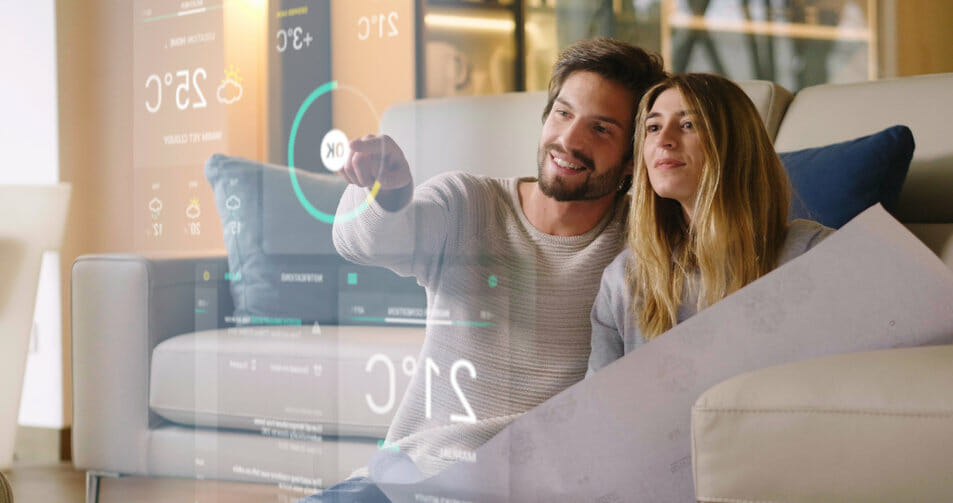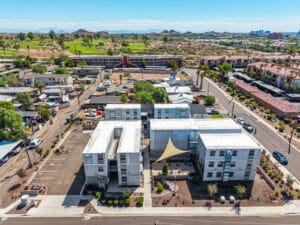The short-term rental landscape has transformed dramatically with the integration of smart home technology, and savvy Airbnb hosts are leveraging these innovations to create exceptional guest experiences while maximizing operational efficiency. As we navigate 2025, smart home integration has become less of a luxury and more of a necessity for hosts looking to stay competitive in an increasingly crowded marketplace. The technology not only enhances guest satisfaction but also provides hosts with unprecedented control over their properties, leading to improved security, energy efficiency, and revenue optimization.
REAL ESTATE NEWS: Scottsdale Quarter acquired for $645.1 million; will get $100 million in upgrades
Understanding Smart Home Integration for Short-Term Rentals
Smart home integration involves connecting various automated systems and devices throughout your property to create a seamless, tech-enabled guest experience. This encompasses everything from automated lighting and climate control to advanced security systems and entertainment platforms. The goal is to create an environment that anticipates guests’ needs while providing hosts with remote monitoring and control capabilities. Modern smart home systems can significantly reduce operational overhead while delivering the premium experience that today’s travelers expect.
1. Implement Comprehensive Security and Access Control
Smart locks and security systems form the foundation of any tech-savvy Airbnb operation. These systems eliminate the need for physical key exchanges while providing enhanced security for both guests and property owners. Advanced access control systems can generate unique codes for each guest, automatically expire after checkout, and provide detailed entry logs.
Why Smart Security Systems Matter:
- Eliminate key exchange logistics and reduce the risk of lost or copied keys
- Provide real-time monitoring and alerts for unauthorized access attempts
- Enable remote property management and emergency response capabilities
- Create detailed access logs for security auditing and guest verification
“Smart lock systems with integrated cameras have revolutionized property security for short-term rentals. Our clients report 47% fewer security incidents and virtually eliminate key-related guest service issues. The peace of mind alone makes this technology invaluable.” – Carter Crowley, Owner of CB Home Solutions.
2. Optimize Climate Control and Energy Management
Smart thermostats and energy management systems can dramatically reduce utility costs while maintaining optimal comfort levels for guests. These systems can automatically adjust temperature based on occupancy, weather conditions, and guest preferences while providing hosts with detailed energy usage analytics.
How to Implement Smart Climate Control:
- Install programmable smart thermostats that can be controlled remotely via smartphone apps
- Implement occupancy sensors that automatically adjust heating and cooling when guests leave
- Use smart window treatments that respond to sunlight and temperature changes
- Integrate air quality monitoring to ensure optimal indoor environments
“Energy costs can consume 20-30% of short-term rental profits. Smart climate systems typically reduce these expenses by 35-40% while improving guest comfort ratings. The technology pays for itself within the first year of operation.” – Mike Aziz, Co-Owner of M1 Home Buyers.
3. Create Immersive Entertainment and Connectivity Experiences
Modern travelers expect seamless connectivity and entertainment options. Smart home integration allows hosts to provide premium entertainment experiences while maintaining control over content access and usage.
Benefits of Smart Entertainment Systems:
- Offer guests personalized streaming experiences without compromising account security
- Provide high-speed mesh WiFi networks that eliminate dead zones
- Enable voice-controlled smart speakers for music, information, and property assistance
- Create automated lighting scenes that enhance entertainment and relaxation
“Guest satisfaction scores increase by an average of 23% when properties offer integrated smart entertainment systems. Guests particularly appreciate the ability to easily connect their devices and access familiar streaming platforms without setup hassles.” – Adam Watson, Founder of Hollywood Mirrors.
4. Leverage Smart Lighting and Ambiance Control
Intelligent lighting systems can transform guest experiences while reducing energy consumption. These systems can automatically adjust throughout the day, create welcoming arrival sequences, and enhance property security through automated scheduling.
Smart Lighting Implementation Strategies:
- Install automated exterior lighting that activates upon guest arrival
- Use circadian rhythm lighting that adjusts color temperature throughout the day
- Create preset scenes for different activities like dining, relaxation, or work
- Implement motion sensors in common areas to improve convenience and safety
“Smart lighting systems create emotional connections with guests while reducing energy costs by up to 60%. The ability to remotely control lighting also enables hosts to address guest concerns and create memorable welcome experiences quickly.” – Adam Seguin, CEO of Myrtle Beach Home Buyers.
5. Integrate Voice Assistants and AI-Powered Guest Services
Voice-activated smart assistants can serve as virtual concierges, providing guests with instant access to property information, local recommendations, and basic troubleshooting support. These systems can significantly reduce host workload while improving guest satisfaction.
AI Integration Opportunities:
- Provide instant answers to common guest questions about amenities and local attractions
- Enable voice-controlled smart home features like lighting, temperature, and entertainment
- Offer personalized recommendations based on guest preferences and local events
- Create automated check-in and check-out processes with voice guidance
Properties with integrated AI assistants report 31% fewer guest service calls and 28% higher guest satisfaction scores. The technology handles routine inquiries automatically, allowing hosts to focus on strategic business growth.” – Luca Dal Zotto, cofounder of Rent a Mac.
6. Implement Smart Maintenance and Monitoring Systems
Proactive maintenance through smart monitoring prevents costly emergency repairs and ensures optimal property conditions. These systems can detect issues before they impact guest experiences while providing valuable data for property optimization.
Smart Monitoring Benefits:
- Detect water leaks, HVAC issues, and electrical problems before they cause damage
- Monitor noise levels to ensure compliance with local regulations and neighbor relations
- Track occupancy patterns to optimize cleaning schedules and maintenance timing
- Provide real-time alerts for security breaches or emergencies
“Predictive maintenance systems reduce property downtime by 45% and prevent 73% of major repair incidents. The cost savings from avoided emergency repairs typically exceed the technology investment within six months.” – Brandon Hardiman, Owner at Yellowhammer Home Buyers.
7. Implement Smart Maintenance and Monitoring Systems
Proactive maintenance through smart monitoring prevents costly emergency repairs and ensures optimal property conditions. These systems can detect issues before they impact guest experiences while providing valuable data for property optimization.
Smart Monitoring Benefits:
- Detect water leaks, HVAC issues, and electrical problems before they cause damage
- Monitor noise levels to ensure compliance with local regulations and neighbor relations
- Track occupancy patterns to optimize cleaning schedules and maintenance timing
- Provide real-time alerts for security breaches or emergencies
Predictive maintenance systems reduce property downtime by 45% and prevent 73% of major repair incidents. The cost savings from avoided emergency repairs typically exceed the technology investment within six months.” – Andrew Reichek, CEO of Bode Builders.
7. Streamline Guest Communication and Support Systems
Smart communication platforms can automate guest interactions while maintaining personal touchpoints throughout the stay. These systems handle routine inquiries, provide instant support, and create seamless communication channels between hosts and guests.
Smart Communication Implementation:
- Deploy chatbots for instant responses to common questions about WiFi, amenities, and local information
- Use automated messaging systems for pre-arrival instructions and post-departure follow-ups
- Implement smart doorbell systems with two-way video communication for enhanced security
- Create digital welcome guides accessible through QR codes or smart displays
“Automated communication systems handle 67% of routine guest inquiries while maintaining 94% guest satisfaction rates. This technology allows hosts to focus on complex issues while ensuring guests receive immediate assistance 24/7.” – Asawar Ali, Marketing Manager at Car Door Lights.
8. Maximize Revenue Through Dynamic Automation
Smart home integration enables sophisticated revenue optimization strategies through automated pricing adjustments, occupancy optimization, and enhanced guest experiences that command premium rates.
Revenue Optimization Strategies:
- Implement occupancy-based pricing that adjusts rates based on demand patterns
- Use guest behavior analytics to identify opportunities for additional services
- Create premium experience packages that leverage smart home capabilities
- Automate upselling opportunities through personalized guest communications
“Hosts using comprehensive smart home automation report average revenue increases of 34% compared to traditional properties. The technology enables premium pricing while reducing operational costs, creating a powerful profit multiplication effect.” – Ryan Whitcher, a real estate expert and CEO of Harmony Home Buyers.
Conclusion
Smart home integration represents a fundamental shift in how successful Airbnb hosts operate their businesses in 2025. The technology not only enhances guest experiences but also provides hosts with unprecedented operational efficiency and revenue optimization opportunities. While the initial investment may seem substantial, the combination of reduced operational costs, increased guest satisfaction, and premium pricing capabilities typically generate positive returns within the first year of implementation.
The key to successful smart home integration lies in selecting technologies that align with your property type, guest demographics, and operational goals. Start with foundational systems like smart locks and thermostats, then gradually expand to more sophisticated automation as your comfort level and business needs grow. Remember that the most successful implementations focus on solving real problems for both guests and hosts rather than simply adding technology for its own sake.




